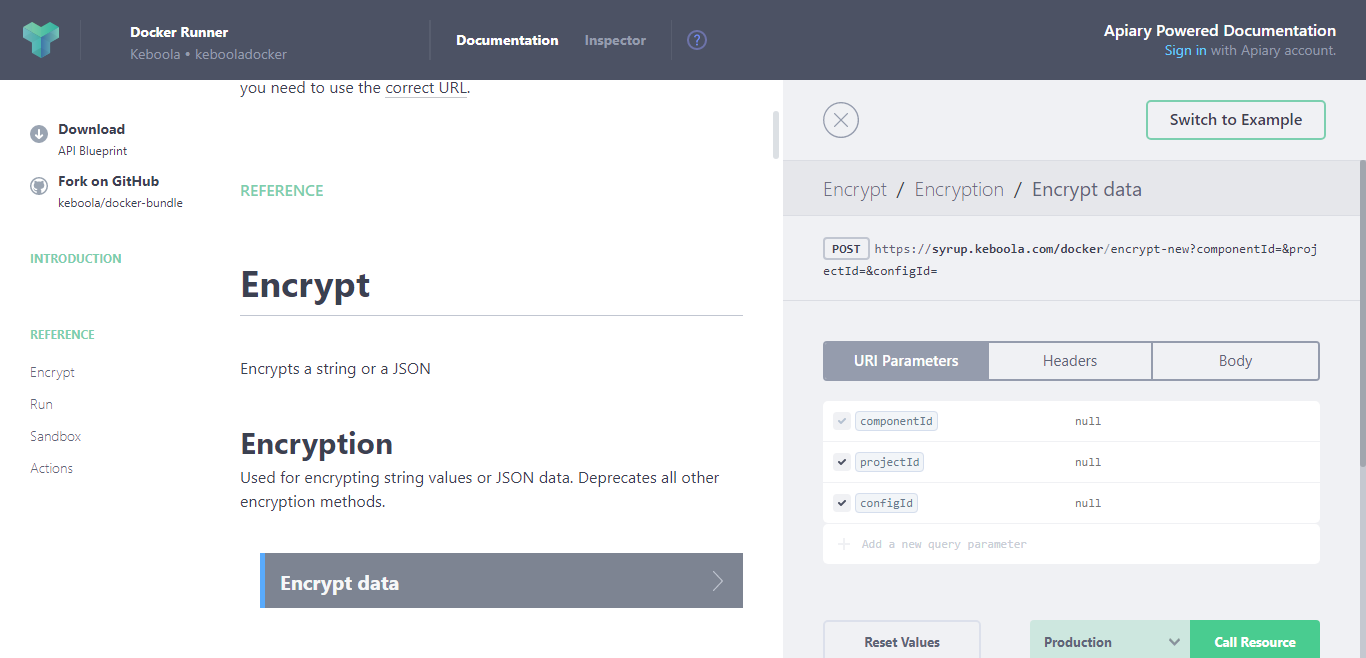Encryption
Many Keboola components use the Encryption API to encrypt sensitive values intended for secure storage. These values are then decrypted within the component itself. This process ensures that the encrypted values are only accessible inside the components and not by API users. Additionally, no decryption API is available, meaning end-users cannot decrypt these values.
Decryption occurs solely during the serialization of configuration to the Docker container’s configuration file. The decrypted data are stored on the Docker host drive and are promptly deleted after the container’s completion. The component code exclusively accesses the decrypted data.
UI Interaction
When saving arbitrary configuration data, if a key is prefixed with the # character, the associated value is automatically encrypted.
For instance, consider the following configuration:

After saving, the configuration appears as follows:

Once saved, the value becomes encrypted and irreversible. The component defines which values are encrypted, indicating that not all values can be encrypted unless explicitly supported by the component.
For example, a component requiring the following configuration:
{
"username": "JohnDoe",
"#password": "password"
}indicates that the password will be encrypted while the username will not. Adding a
prefix # to username is ineffective, as the component does not recognize such a key,
even though its value would be encrypted and decrypted normally. Internally, the
Encryption API encrypts these values before saving.
UI Configuration Adjustment
The UI prioritizes encrypted values over plain ones. If both password and #password are provided, only #password will be retained.
Consequently, this configuration:
{
"username": "JohnDoe",
"#password": "KBC::ProjectSecure::ENCODEDSTRING",
"password": "secret",
}will be transformed to:
{
"username": "JohnDoe",
"#password": "KBC::ProjectSecure::ENCODEDSTRING"
}Encrypting Data with API
The Encryption API can handle
both strings and arbitrary JSON data. For strings, the entire string is encrypted. In JSON data,
only scalar keys starting with # are encrypted. For example, encrypting the following:
{
"foo": "bar",
"#encryptMe": "secret",
"#encryptMeToo": {
"another": "secret"
}
}results in:
{
"foo": "bar",
"#encryptMe": "KBC::ProjectSecure::ENCODEDSTRING",
"#encryptMeToo": {
"another": "secret"
}
}To encrypt a single string, such as a password, submit the text string for encryption (no JSON or quotation is used). For example, encrypting
mySecretPassword
yields
KBC::ProjectSecure::ENCODEDSTRING
The Content-Type header in the request differentiates whether the body is treated as a string (text/plain) or JSON (application/json).
Use the Console in Apiary to call the API resource endpoint.

Encryption Parameters
The Encryption API accepts the following optional parameters:
componentId— ID of a Keboola component,projectId— ID of a Keboola project,configId— ID of a component configuration, andbranchType— Branch type — eitherdefault(meaning the default production branch) ordev(meaning any development branch other than the production).
The cipher created depends on the provided parameters:
-
With only
componentId, the cipher starts withKBC::ComponentSecure::and is decryptable across all configurations of that component. This is recommended for component-specific secrets applicable across all customers (e.g., as a master authorization token). -
Adding
projectIdto thecomponentIdchanges the prefix toKBC::ProjectSecure::, making the cipher decryptable within the project’s component configurations. This is recommended for all secrets used within a typical Keboola project. -
Providing all three IDs (
componentId,projectId,configId) generates a cipher starting withKBC::ConfigSecure::, limiting decryption to a specific configuration. This is useful for preventing the copying of configurations. -
Using only
projectIdyields a cipher that begins withKBC::ProjectWideSecure::, decryptable across the project’s configurations. This cipher type helps encrypt information shared across multiple components, e.g., SSH tunnel settings. -
Adding
branchTyperestricts the encryption to the default production branch or to development branches. This means an encrypted value with this setting cannot be moved between production and development branches or vice versa. It is not possible to encrypt a value for just one development branch.-
Using
branchTypewithcomponentIdandprojectIdresults in a cipher beginning withKBC::BranchTypeSecure::. This allows decryption either in the production or in the development configuration of the specified component in the project. -
Using
branchTypewith all three IDs (componentId,projectId,configId) creates a cipher that starts withKBC::BranchTypeConfigSecure::. It can only be decrypted within a specific production or development component configuration in a specific project. -
Using
branchTypewithprojectIdcreates a cipher beginning withKBC::ProjectWideBranchTypeSecure::. This cipher allows decryption either in the production or in the development configurations in the project.
-
The following rules apply to all ciphers:
- Providing only a
configIdwithout aprojectIdis not allowed. Similarly, providing onlybranchTypewithoutprojectIdis also not allowed. - Cipher decryption is only possible in the region where the cipher was created. For example, ciphers with prefixes
KBC::ProjectSecureKV::(Azure) orKBC::ProjectSecureGKMS::(GCP), instead ofKBC::ProjectSecure::(AWS), use the same business logic but are specific to their region and technology and are not interchangeable. - There is no decryption API; the cipher is decrypted internally before a component is run.
- Ciphering a value that is already encrypted does not change its encryption.
- There is no way to retrieve the component, project, configuration ID, or branch type from the cipher.
- The IDs referenced during cipher creation do not need to exist then. For example, you can create a cipher for a component not yet registered, which will start working as soon as the component is registered. Similarly, ciphers can be created for projects and configurations without access to them.
By default, values encrypted in component configurations are encrypted using the KBC::ProjectSecure:: cipher, meaning
the cipher is not transferable between regions, components, or projects. It is transferable between
different configurations of the same component within the project where it was created. If you create a configuration containing KBC::ConfigSecure:: ciphers,
note that the configuration will not work when copied.
